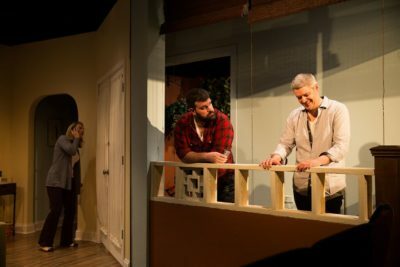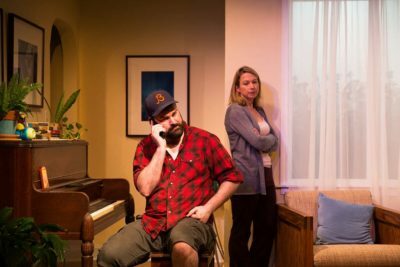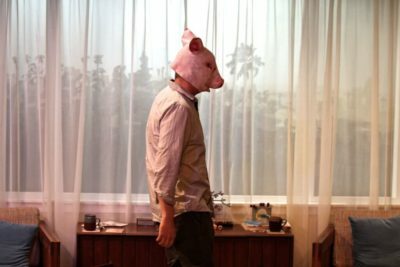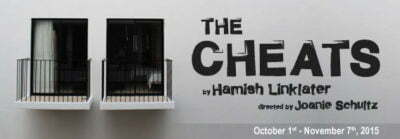The Cheats
Directed by Joanie Schultz
Produced by Steep Theatre Company, Chicago
The Full Devastation of Ordinary Betrayals Exposed
A year ago, Hamish Linklater’s first play, The Vandal, enjoyed its Midwestern debut at Steep Theatre Company, and was widely praised by critics, including me, as a bewitching examination of loneliness and loss. The artists must have felt satisfied too, because Steep has partnered with Linklater again to produce his new play, The Cheats. The plays are superficially opposites; The Vandal was about death, two of its three characters communicated mainly through silences, and director Shade Murray gave it an abstract staging; The Cheats is about love, its characters talk too much without listening to each other, and Joanie Shultz staged it realistically. However, Linklater’s talent for writing just the right amount of dialogue to allow his actors to build characters who are both mesmerizing and plausible, and for producing an atmosphere of tension, are just as present here.

The Cheats takes place very specifically in October of 2012; several lines at the top of the play refer to Hurricane Sandy and Chris Christie, and Brian Williams still has a career. That aimless opening monologue is delivered by Anne (Kendra Thulin), from off-stage, while under the impression that her husband, John (Peter Moore) is listening to her in the living room. He isn’t. Instead, John sits on the porch, as he often does, secretly watching the across-the-street neighbors, Jonathan (Brad Akin) and Susie (Julia Siple). Jonathan is a distant relative of Anne’s by marriage, but the two households don’t communicate, except for once, when John sent Jonathan a card with his phone number and an offer to walk his enormous dog, after Susie’s mother died. Nonetheless, John is fascinated when he sees his neighbors’ marriage apparently wither before his eyes: he reports to Anne that Jonathan stared in silence at Susie for an extended moment, and then, she left the house. While Anne agrees something strange definitely happened, she does not understand John’s desire to get involved by inviting Jonathan into their house. Much to their surprise, Jonathan calls to announce he’s coming over on his own.

His presence is painfully awkward. John and Anne don’t want to admit to knowing any of his business, and he doesn’t state any particular reason for his being there, but is plainly upset. Nonetheless, the three stand apart from each other, attempting to make small-talk and fake friendliness. Jonathan praises Anne and John’s middle-class house and sense of decoration (scenic design by Chelsea Warren). He’s clearly a working man, as shown by his cargo shorts and flannel shirt (costumes by Izumi Inaba), and unlike his hosts, has no children. Despite Anne’s clear preference that Jonathan leave and that John not leave her alone with him, John does exactly that. John feels a strange, but powerful kinship with Jonathan he won’t fully explain to Anne. Part of Jonathan’s interest in Anne is for reasons he won’t explain to John. Based on the play’s title, you can anticipate what those mysteries are, but this piece isn’t about its action, it’s about the emotional aftermath.
Naturally, considering the influence they had on the script’s revisions, the actors understand and embody their characters perfectly. Brad Akin, in particular, seems to have no artifice about him at all. Jonathan is defensive, embarrassed, nerdy, sarcastic, and has a knack for phrasing things in an unpleasant manner. He clearly is in a great deal of pain and confusion, and his mixture of vulnerability and sullenness is both pitiful and repulsive. Peter Moore, as John, is in a similar state, but is better at maintaining a genteel, sociable façade. While John is struggling with grief and a shameful past, he claims to lack Jonathan’s self-loathing, and is more high-handed and arrogant. Kendra Thulin, who also had a major role in The Vandal, plays the character who shows the least long-term emotional strain, initially, but is in the most precarious situation. Anne also tries to maintain a polite demeanor, but is the most pragmatic of the three, despite her tendency to babble and make peace by playing the clown.

Director Joanie Schultz has paced this production to a lean ninety minutes, but is careful to steadily ratchet up the tension. A notable feature of The Cheats is its foregrounding of voyeurism; characters often are onstage in a room alone, allowing us to observe them in their most private moments, or call to each other from offstage, making us feel like we are really peering into a house that was not constructed for our benefit. It creates a creepy atmosphere, making the characters’ feelings of guilt and violation all the more palpable, and infusing dread into conversations which, in themselves, are strange, but not clearly leading to violence or anything else destructive. Like in Who’s Afraid of Virginia Woolf?, the interactions among these characters are agonizing and frequently infuriating to watch, but the curious difference is that they are not, for the most part, malicious. Yet destructive they are. Together, Linklater and Steep have developed a talent creating lingering moods, which here, they use to disturbing effect.
Recommended
Jacob Davis
Playing at Steep Theatre, 1115 W Berwyn, Chicago. Tickets are $35; to order, call 866-811-4111 or visit steeptheatre.com. Showtimes are Thursdays-Saturdays at 8:00 pm with select Sunday matinees through November 7. Running time is ninety minutes with no intermission.

